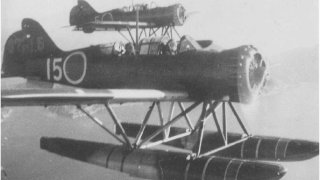Nobuo Fujita: The Story of the Only Japanese Pilot to Bomb America During WWII
The bombs Fujita dropped on a forest in Oregon caused little damage. Many years later, Fujita's story became an emblem of reconciliation.
Forgiveness after a time of war can be a difficult thing. The story of Nobuo Fujita is a perfect example of how the past needs to be left behind if healing is to ever occur.
Fujita was a 31-year-old warrant flight officer who was ordered in early September 1942 to conduct a bombing mission over the forests of western Oregon. Fujita – who was conscripted into the Imperial Japanese Navy in 1932 and began flight training a year later – earned the dubious distinction of being the only Japanese pilot to bomb the continental United States during the Second World War. At the time, he believed he was honorably serving his nation – and more importantly, Emperor Hirohito – by firebombing the forest near the town of Brookings.
Flying a floatplane launched from the long-range submarine aircraft carrier I-25, the pilot dropped a pair of incendiary bombs. Due to the damp conditions, the attack caused little damage. Neither bomb touched off the massive fire Fujita and his superiors had hoped for. Fujita successfully returned from what he had believed might be a one-way suicide mission. He spent the rest of the war training other pilots, and when the hostilities ended, he returned to his civilian life.
That could have been the end of what was really a footnote in the history of the Pacific War. But in the early 1960s, Fujita was invited to visit the small coastal community he had bombed, Brookings, which sits near the California border.
Goodwill Gesture
It may seem strange that the town invited the pilot for a visit in 1962, just 20 years after the incident occurred. Some believed it was a goodwill gesture, but not everyone was on board. A full-page editorial in The Brookings-Harbor Pilot, the hometown newspaper, argued that Fujita should not be an honored guest. More than 100 residents signed the letter, which used a derogatory term for the Japanese to describe Fujita.
After much discussion, it was eventually decided that the former adversary would receive the official invitation.
The move actually earned the respect of then-President John F. Kennedy, who congratulated the town for its efforts to promote international friendship. The trip was formally arranged after the Japanese government was assured that Fujita would not be arrested or tried as a war criminal.
The Sword of Fujita
Fujita arrived in the town with a rather unique possession. It was a centuries-old katana – the type of sword carried by samurai warriors – that had been entrusted with him during the war. The sword had been passed down in the family for generations, and it was actually in the cockpit of Fujita's plane back in September 1942. He subsequently took it on every flight.
According to The New York Times, the former pilot had planned to use the sword to commit seppuku – ritual suicide – had he received a hostile reception. Instead, the town treated Fujita with respect and affection, and in a gesture of goodwill, he donated the sword – a prized family heirloom – to the people of Brookings.
"This is the finest way of closing this story," he said as he presented the sword to Mayor C. Fell Campbell. "It is the samurai tradition to pledge peace and friendship by presenting a sword to a former enemy."
After that moment, Fujita was seen only as a friend. Over the next three decades, he visited the town several times, donated books about international relations to the community, and despite financial hardships still hosted a visit to Japan by a group of Brookings high school students.
In 1992, he planted a tree at the bomb site as a further gesture of peace.
Just days before his death on Sept. 20, 1997, at a hospital in Tsuchiura, Ibaraki Prefecture, Fujita was made an honorary citizen of Brookings. Some of his ashes were even buried at the bomb site, proof that Oregon was not his former target – it had become his second home.
About the Author: Peter Suciu
Peter Suciu is a Michigan-based writer who has contributed to more than four dozen magazines, newspapers and websites. He regularly writes about military hardware, firearms history, cybersecurity and international affairs. Peter is also a Contributing Writer for Forbes.
Image: Creative Commons.

